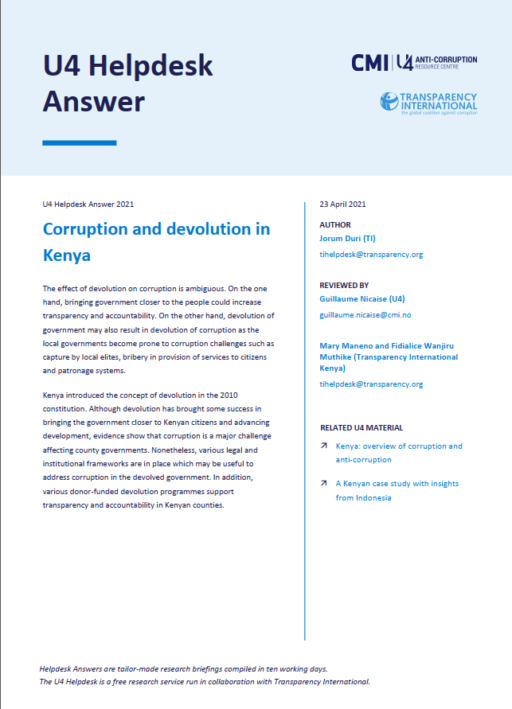
This Anti-Corruption Helpdesk brief was produced in response to a query from a U4 Partner Agency. The U4 Helpdesk is operated by Transparency International in collaboration with the U4 Anti-Corruption Resource Centre based at the Chr. Michelsen Institute.
Query
Please provide a Helpdesk answer on corruption and devolution in Kenya, including a section on advantages/disadvantages of devolution to counter corruption as well as examples of how anti-corruption measures can be integrated into devolution programmes
Summary
The effect of devolution on corruption is ambiguous. On the one hand, bringing government closer to the people could increase transparency and accountability. On the other hand, devolution of government may also result in devolution of corruption as the local governments become prone to corruption challenges such as capture by local elites, bribery in provision of services to citizens and patronage systems.
Kenya introduced the concept of devolution in the 2010 constitution. Although devolution has brought some success in bringing the government closer to Kenyan citizens and advancing development, evidence show that corruption is a major challenge affecting county governments. Nonetheless, various legal and institutional frameworks are in place which may be useful to address corruption in the devolved government. In addition, various donor-funded devolution programmes support transparency and accountability in Kenyan counties.
Contents
1) Introduction
2) Corruption issues affecting devolution in Kenya
3) Anti-corruption measures relevant to devolution in Kenya
4) Examples of how anti-corruption measures have been integrated in donor funded devolution programmes in Kenya and Rwanda
5) Conclusion
6) Reference
Main points
— County governments in Kenya have become hotspots for corruption. A number of county governors and country officials have been implicated in corruption cases over the years
— Reports from the Ethics and Anti-Corruption Commission, Transparency International Kenya and the Kenya National Audit Office indicate the prevalence of corruption in counties, ranging from bribery, nepotism and patronage to embezzlement and mismanagement of public resources.
— Kenya has established anti-corruption legal and institutional framework that are useful to address corruption in counties. In addition, donor-funded devolution programmes have incorporated measures to support transparency and accountability in the country
Authors
Jorum Duri, [email protected]
Reviewers
Guillaume Nicaise (U4 Anti-Corruption Resource Centre)
Mary Maneno and Fidialice Wanjiru Muthike (Transparency International Kenya)
Date
21/07/2021

